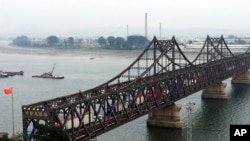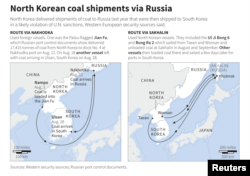It is difficult to gauge the impact of the increased sanctions imposed on North Korea, with reports of both plummeting exports in the last year and increasing illicit trade of banned minerals and arms.
U.S. President Donald Trump’s “maximum pressure” strategy aims to increase sanctions on North Korea and force the Kim Jong Un government to seek relief by agreeing to give up its threatening nuclear weapons and ballistic missile program, or face increasing hardship and possible collapse from within. If sanctions fail to end the North Korean nuclear threat, the Trump administration has emphasized it is prepared to use military force, as well.
Trade decline
The latest U.S.-led round of sanctions at the United Nations Security Council, which were imposed in August and September of 2017, produced a total export ban on North Korea’s $3 billion coal and other mineral industries, its $800 million clothing manufacturing output, and its lucrative seafood industry, as well as cutting oil imports by a third.
China, which accounts for over 90 percent of North Korea’s total trade, reported a 37 percent drop in exports from the North in 2017 as a result of the sanctions. If fully enforced, the restrictions would cut the North’s exports by 90 percent in 2018, a loss estimated to be worth $2.3 billion. Independent media reports have confirmed significantly reduced trade and business activity in Dandong, the Chinese border city where most trade with North Korea occurs.
A number of Chinese banks have also reportedly restricted North Korea financial activities, in compliance with U.N. sanctions, which is rapidly reducing Pyongyang’s foreign currency reserves.
Economic discrepancies
However, there are concerns the Chinese customs data indicating economic shortfalls is not being reflected in rapid increases in food and fuel prices, or in a steep increase in the currency exchange rate.
“If the supply and demand in foreign currency decreases due to an increase in trade deficit, the exchange rate should be higher. But it is currently not higher,” said Lim Soo-ho, a North Korea analyst with the South’s Korea Institute for International Economic Policy (KIEP.)
The current stability in prices could indicate a delayed economic effect, in that North Korea may have already sold large quantities of coal, for example, prior to the U.N. ban taking hold in September of 2017. In the coming months, as Pyongyang’s foreign currency dwindles, Lim says, inflation should increase.
Illicit activities
There are also concerns that China, Russia and other counties are illicitly bolstering the North Korean economy through the smuggling of banned commodities, along with arms and chemical weapons sales, and cyber attacks.
Portions of a confidential United Nations report that was recently made public said North Korea earned close to $200 million from exporting coal and other banned commodities last year by using false documents and complicit foreign companies in China, Malaysia, Russia and Vietnam.
While Beijing and Moscow voted in favor of imposing tough sanctions on North Korea in the Security Council, both also want to maintain economic and political stability on the Korean Peninsula, and have called for increased negotiations to peacefully resolve the nuclear stand-off.
There have been reports that Russia is becoming a new transit hub for banned North Korean coal to compensate for the export ban in China. Moscow and Pyongyang have denied these illicit coal trade accusations. Even if true, Russia accounts for only 2 percent of North Korea’s trade.
“Even if such illegal activities continue, I think it is difficult to have a significant influence considering the size of trade between Russia and North Korea,” said KIEP economic analyst Lim Soo-ho,
In recent months Japan also reported four suspected illegal transfers at sea between sanctioned North Korean vessels and international ships that were witnessed by surveillance aircraft.
The U.S. in February issued new unilateral sanctions on companies and vessels linked to North Korean shipping to restrict illicit ship- to-ship transfers. Washington tried to include forced maritime interceptions of North Korean vessels in the last round of U.N. sanctions but could not convince Chins and Russia to agree.
Also last year, a North Korean cyber network, known as the “Lazarus Group," stole $81 million from the Bangladesh Central Bank, according to a report by the Center for Defense Studies (C4ADS), developed in conjunction with the Sejong Institute in South Korea,
Chemical weapons
The U.N. report by its Panel of Experts that document North Korea’s compliance with sanctions, also indicated that Pyongyang has increased shipments to Syria of materials and equipment used in chemical manufacturing plants, as well as arms to Africa.
“This report doesn't just look at the Syria-North Korea connection. It also talks about several countries in Africa, primarily sub-Saharan Africa, that North Korea is proliferating weapons systems and training and military capabilities to,” said Bruce Bechtol, a North Korea proliferation expert at Angelo State University in Texas, during a recent interview with NPR (National Public Radio).
Bechtol has also said that North Korea has significant arms deals with Iran, which funnels its weapons to terrorist organizations like Hamas, and militant groups like the Houthi rebels in Yemen.
With illicit deals, evasions, and a lack of transparency, the full impact of sanctions remains unclear. But Pyongyang has become more cooperative of late, participating in the winter Olympics, temporarily halting further nuclear and missile tests, and agreeing to increased inter-Korean dialogue.
President Trump says the North’s openness to talks is the direct result of his “maximum pressure” approach, but adds that there will be no relief until the Kim government takes concrete action to end its nuclear program.
Lee Yoon-jee in Seoul contributed to this report.






